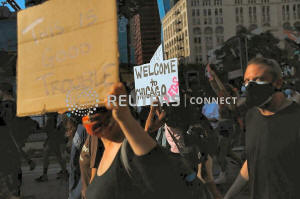On Chicago's South Side, some violence-weary residents open to federal
investigators
 Send a link to a friend
Send a link to a friend
 [July 27, 2020]
By Brendan O'Brien and Tom Polansek [July 27, 2020]
By Brendan O'Brien and Tom Polansek
CHICAGO (Reuters) - Many Chicagoans
vehemently oppose President Donald Trump's pledge to send federal
officers to the third-largest U.S. city, after seeing camouflaged agents
deployed in Portland club and tear-gas anti-racism protesters.
But in South and West Side neighborhoods hit hardest by a recent spike
in gang violence, some Chicago residents welcomed the move and said
federal agents may be able to help solve crimes.
"I appreciate it and I like it," said Cedrick Easterling, a former gang
member, who was shoveling garbage scattered in the South Side
neighborhood of Englewood as part of his work clearing vacant lots.
"If you sit at that park, you will hear shots all over Englewood," said
Easterling, who was once shot himself, pointing south toward Ogden Park.
Like most in Chicago, Easterling is not a fan of Trump, who won just 51
of the city's 2,069 precincts in the 2016 presidential election.

Easterling, 54, has lived in Englewood since he was seven. He said crime
is particularly bad this year and Trump should consider bringing in the
National Guard and using drones to record evidence of crimes as they
occur
Others were more cautious, saying they feared an increased federal
presence would erode civil liberties in a city that has had
long-standing problems with police brutality in poor, predominantly
Black neighborhoods.
Trump said last week that hundreds of officers from the FBI and other
federal agencies would help fight crime in Chicago. The city is
suffering a spike in violent crime, including a drive-by shooting by
suspected gang members at a funeral last week that wounded 15 people.
Trump has sought to project a law-and-order stance as he seeks
re-election on Nov. 3, targeting cities controlled by Democrats who he
says are soft on criminals. Critics say the administration is seeking to
divert attention from its widely criticized response to the coronavirus
pandemic.
Eight of 10 people Reuters interviewed in wealthier and safer areas on
Chicago's North Side opposed any form of intervention from Trump, saying
federal officers could fan tensions in the city and would not address
underlying issues such as unemployment.
"I don't see how the feds are going to help with anything," said Michael
Flaherty, a 53-year-old architect who lives in Chicago's Gold Coast
neighborhood.
"They're violent. Violence doesn't fix violence."
The view was often more nuanced on the South and West Sides, where a
much higher proportion of residents have experienced violent crime.
Junior Jaber, 28, recalled the day four years ago when his friend Paul
Hamilton, then 47, was killed by a stray bullet while walking his dog in
Ogden Park.
"I was mad. He had nothing to do with anything," said Jaber, who runs
Englewood Food Mart, where Hamilton worked as a butcher. "We got to do
something. It's almost like a war zone out here."
Jaber said he was all for it when he learned of Trump's plan to send in
federal agents.
"They should clean it all up. Just do their job," said the 28-year-old
father of two as he sold sodas, lottery tickets and pints of liquor.
U.S. Attorney General William Barr has said the reinforcements to
Chicago do not involve the type of forces that were deployed to Portland
and have been accused of civil rights violations and using excessive
force.
[to top of second column]
|

Protesters hold placards as they take part in a demonstration
against police violence and racial inequality, in Chicago, Illinois,
U.S., July 25, 2020. REUTERS/Shannon Stapleton

Protesters said uniformed personnel without name tags or agency
badges snatched young people off the streets into unmarked vans
before eventually releasing them.
Protests have continued around the United States since the May 25
death of George Floyd, a Black man, in Minneapolis police custody.
The U.S. Justice Department said on Thursday it would investigate
the use of force in Portland and whether federal agents had proper
identification.
Black Lives Matter activists, who have led protests against police
brutality in Chicago, are suing federal officials to try to ensure
agents do not violate civil rights. Chicago Mayor Lori Lightfoot has
told residents all new federal resources would be "investigatory in
nature" and vowed to pursue all available legal options if federal
officers go beyond that.
'INNOCENT BYSTANDERS'
While Chicago's murder rate had been falling in recent years, there
were 116 murders over the 28 days through July 19, an increase of
nearly 200% compared with the same period in 2019, police department
data shows.
Some residents of East Garfield Park, a poor neighborhood on
Chicago's West Side, support federal intervention after gang
shootings hit unintended targets, said Damien Morris, director of
violence prevention initiatives for local nonprofit Breakthrough.
"When you have women and kids getting shot - innocent bystanders -
you have residents that feel like something needs to happen," Morris
said.
Trump sent a smaller number of special agents and law enforcement
researchers to Chicago in 2017 after a spike in violent crime.
Phil Bridgeman, 49, said he opposes all federal law enforcement in
Chicago. Even if the federal agents could help solve high-profile
cases, he said, they will not solve the root causes of violent
crime.
"It's not going to help, it's going to agitate," said Bridgeman as
he sold "Black Lives Matter" T-shirts in the middle of a busy
boulevard.
Vaughn Bryant, executive director of anti-violence group
Metropolitan Peace Initiatives, was concerned by "a greater threat
to people's freedom," with the arrival of more agents.

In Englewood, a man who goes by the name Joe Pug sat in a lawn chair
with several other people on a sidewalk opposite a small police
station. The 49-year-old, who has lived in the neighborhood for most
of his life, supports federal agents investigating shootings.
He said the South and West Sides also need massive investments in
education and job creation, especially for young Black men.
"There is nothing here, nothing for them," he said.
(Reporting by Brendan O'Brien and Tom Polansek in Chicago; Editing
by Caroline Stauffer and Daniel Wallis)
[© 2020 Thomson Reuters. All rights
reserved.] Copyright 2020 Reuters. All rights reserved. This material may not be published,
broadcast, rewritten or redistributed.
Thompson Reuters is solely responsible for this content. |